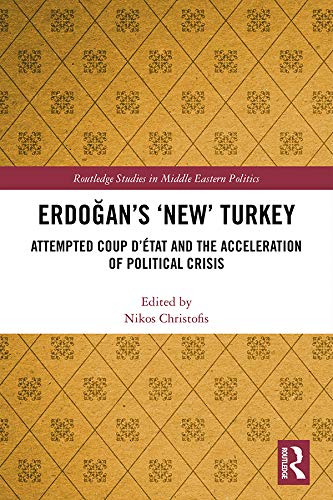Edited by Nikos Christofis and published by Routledge in October 2019
“Demonstrating how Turkey’s politics have developed, this book focuses on the causes and consequences of the failed coup d’état of 15 July 2016. The momentous event and its aftermath challenges us to ask if the coup was the cause of Turkey’s present crisis, or simply an accelerant of trends already in motion, and thus a catalyst for the realization of Erdoğan’s latent authoritarian impulses.
Bringing together approaches from politics, sociology, history and anthropology, the chapters shed much-needed light on these crucial questions. They offer scholars and nonspecialists alike a comprehensive overview of the implications of the coup attempt and its aftermath on the issues of religion, democracy, the Kurds, the state, resistance and more besides. Its effects have been felt in almost every aspect of Turkish society from religion to politics, yet it came at a time when Turkey was already experiencing significant social and political turmoil under the increasingly authoritarian leadership of President Recep Tayyip Erdoğan.
Readers interested in contemporary politics, Turkish and Middle Eastern studies will find the volume useful, as they ponder other cases in this era of democratic retrenchment and global turmoil.”
Nikos Christofis is an associate professor in the Center for Turkish Studies and in the School of History and Civilization at Shaanxi Normal University, Xi’an, China. His work focuses on comparative historical analysis of Greece, Turkey and Cyprus. He has published extensively in Greek, English, Turkish, Chinese and Spanish. He is the author of Turkey in the Long Sixties: Left Politics and the Radicalization of the Student Movement (2020, in Greek); co-editor of Cypriots Nationalism in Context: History, Identity and Politics (2018), and editor of War and Resistance in Thessaly: Aspects of its History during the 1940s (2017) and Cyprus, the Left and Colonialism (2020) (both in Greek).
TABLE OF CONTENTS
Chapter|28 pages
Introduction
Accelerating political crisis in Erdoğan’s Turkey
With Nikos Christofis
Part I|1 pages
Politics, transformation and state (re)formation
Chapter 1|9 pages
The brutalisation of Turkey 1
With Hamit BozarslanGET ACCESS
Chapter 2|18 pages
The AKP rule and the directorate of religious affairsWith Mustafa Ş
Chapter 3|17 pages
On the watch
Civil–military relations and affective politics in Turkey after the failed 15 July 2016 coup attempt
With Sertaç Kaya ŞenGET ACCESS
Chapter 4|19 pages
Becoming an autocracy under (un)democratic circumstances
Regime change under AKP rule
With Rosa Burç, Mahir TokatlıG
Chapter 5|19 pages
The enduring politics of state capture in Turkey
Situating the AKP–Gülen Concordat in historical perspectiveWith Simon P. WatmoughGET ACCESS
Chapter 6|12 pages
The transformation of citizenship before and after the 15 July coup attempt
The case of civil martyrdom
With Pınar Melis Yelsalı ParmaksızGET ACCESS
Part II|1 pages
Democracy, solidarity and hegemonic politics
Chapter 7|13 pages
Making sense
Uncertainties, anxieties and the affective politics of denial in post-coup attempt Turkey
With Aimilia VoulvouliGET ACCESS
Chapter 8|16 pages
Crisis of hegemony, but no counter-hegemonic project
Understanding the failed 15 July coup in Turkey
With Axel Gehring
Chapter 9|20 pages
The poverty of state theory
How Marxists in Turkey read the 15 July coup attempt
With Özgür Mutlu UlusE
Chapter 10|24 pages
International solidarity perplexed
From the certainties of Gezi Park to post-coup complexities
With Leonidas KarakatsanisGET ACCESS
Chapter 11|16 pages
Conquering the state, subordinating society
A Kurdish perspective on the development of AKP authoritarianism in Turkey 1
With Joost Jongerden

